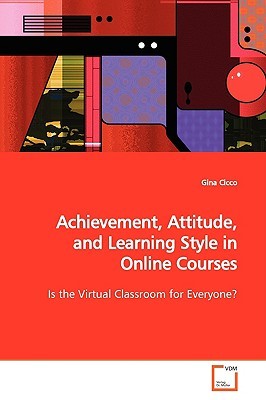
- We will send in 10–14 business days.
- Author: Gina Cicco
- Publisher: VDM Verlag
- ISBN-10: 3639153227
- ISBN-13: 9783639153224
- Format: 15.2 x 22.9 x 0.7 cm, minkšti viršeliai
- Language: English
- SAVE -10% with code: EXTRA
Achievement, Attitude, and Learning Style in Online Courses (e-book) (used book) | bookbook.eu
Reviews
Description
This monograph discusses a study conducted with a sample of graduate education students enrolled in online and in-class courses. The study examines the differences in achievement among students enrolled in similar courses, delivered through competing instructional modalities: online and in-class. These students' attitudes toward computer-based learning and their learning-style preferences were examined to note existing relationships among the variables as they relate to overall performance in respective courses. Significant findings revealed that certain learning-style preferences correspond to greater satisfaction and improved performance in online courses, which provides some explanation as to why individuals may be more successful than others in online courses. The study provides implications for improved practice in customizing online and in-class courses to meet students' needs. It is also noted that these findings, when applied, may help to raise student awareness of their own learning styles, increase retention at various levels of higher- education, and enhance the delivery of advisement based on learning-style assessment.
EXTRA 10 % discount with code: EXTRA
The promotion ends in 23d.14:10:45
The discount code is valid when purchasing from 10 €. Discounts do not stack.
- Author: Gina Cicco
- Publisher: VDM Verlag
- ISBN-10: 3639153227
- ISBN-13: 9783639153224
- Format: 15.2 x 22.9 x 0.7 cm, minkšti viršeliai
- Language: English English
This monograph discusses a study conducted with a sample of graduate education students enrolled in online and in-class courses. The study examines the differences in achievement among students enrolled in similar courses, delivered through competing instructional modalities: online and in-class. These students' attitudes toward computer-based learning and their learning-style preferences were examined to note existing relationships among the variables as they relate to overall performance in respective courses. Significant findings revealed that certain learning-style preferences correspond to greater satisfaction and improved performance in online courses, which provides some explanation as to why individuals may be more successful than others in online courses. The study provides implications for improved practice in customizing online and in-class courses to meet students' needs. It is also noted that these findings, when applied, may help to raise student awareness of their own learning styles, increase retention at various levels of higher- education, and enhance the delivery of advisement based on learning-style assessment.


Reviews